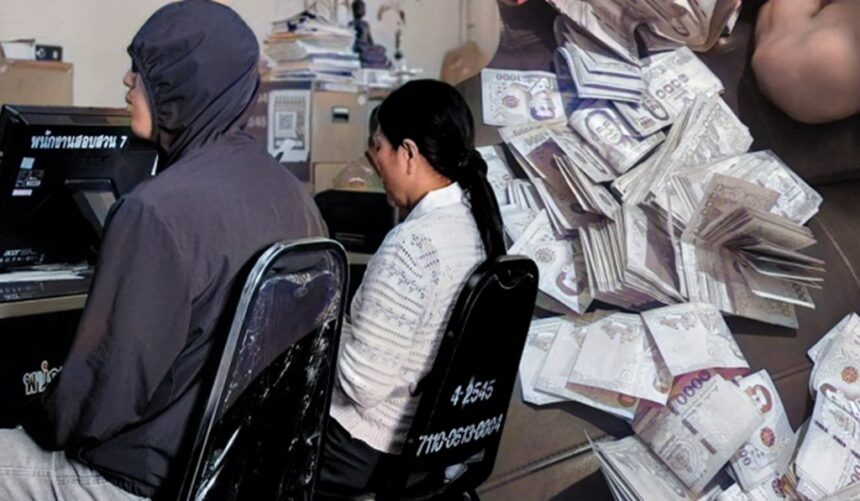CHIANG RAI – Chinese criminal groups have moved their base to the Chiang Rai-Laos border, increasingly targeting young people, manipulating them into opening mule bank accounts and smuggling money across the border..
These Chinese criminal groups claim to run online businesses and ask victims to open accounts, then take them to withdraw cash before smuggling the money across borders. Many young people who get caught up in these scams end up with ruined futures, leaving their studies behind and putting a heavy strain on their families.
Since the authorities introduced strict measures to freeze bank accounts linked to mule activity, some shops and online sellers have been caught up by mistake. Fraudsters often instruct victims to transfer money to a genuine seller’s account first, then move it to a mule account next time.
As a result, banks have frozen some sellers’ accounts, even when they have done nothing wrong. The Bank of Thailand and the police have tried to speed up the process for unlocking these accounts, but the system still faces delays, especially when helplines go unanswered.
In rural areas like Chiang Rai, mule gang activity has become severe. Most of those targeted to open bank accounts are teenagers. There’s also evidence that money is moved across borders. After Cambodia closed some border points, Chinese grey gangs set up fresh operations on the Lao side, using Thai areas along the border, such as Chiang Saen, as their main base.
Millions Flowing Through Accounts
Chiang Saen in Chiang Rai has become a key area for these groups. Local volunteer Surachart Piwdaeng, who helps victims, told the Thairath how these gangs prey on students aged 16 to 17. They approach teenagers and persuade them to open bank accounts, supposedly for an online business. Gang leaders find recruits, sometimes taking them to pubs or giving them alcohol as part of their ruse.
Once the young person opens an account, the gang takes their ATM card. When the Chinese gang moves stolen money into a mule account, the person in charge gets the signal to withdraw the cash. The funds are then taken into Laos.
Some teens have seen huge sums come into their accounts, from eight to 20 million baht, only for those accounts to be frozen shortly after. Many have no idea they’ve been part of a scam, including several technical college students in the area who were lured in the same way.
Most cases lead back to one suspect who organizes victims and hands their details to the gang across the border. The gang boss has about ten helpers, renting a house in Chiang Saen to manage operations. Money gets withdrawn at various ATMs, then brought back to this house before being transferred to Laos every three days.
These call centre gangs now run their operations from Laos, having shifted out of Cambodia. In Chiang Saen, it’s just a short trip across the Mekong River to the gang’s headquarters.
Teens Targeted in Chiang Saen
Surachart spoke about helping around ten teenagers from Chiang Saen who were tricked into opening accounts. In most cases, when complaints reached the police, the teenagers received court summons for fraud linked to mule accounts.
One student was told he could earn extra money selling goods online, but he had to open a bank account to receive payments. After the account was opened and money came in, someone took him to an ATM to withdraw cash.
When his account was frozen, they told him not to worry, claiming it was only temporary. He now faces a court case in Bang Khun Thian over public fraud, with his parents forced to travel from Chiang Rai to attend the trial.
Another student, studying in Chiang Rai town, lent his account to a friend who claimed it was for family transfers.
The account details were then given to the gang. After 600,000 baht had passed through, he withdrew the cash for his friend and soon after found his account frozen and a police complaint filed. He says he can no longer focus on his studies.
Many victims and families have reported the scams to local police, but feel that little has been done. Frustration is growing, as authorities have not managed to arrest senior figures in these networks, leaving the real problem unsolved.














